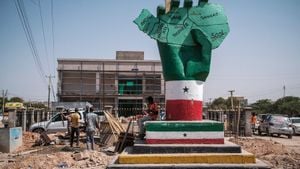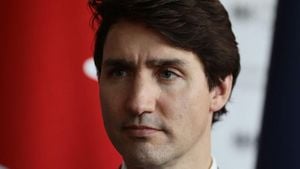South Korean President Yoon Suk Yeol's recent declaration of martial law has escalated tensions within the Asian nation and sparked widespread protests among its citizens. This unprecedented situation has led to significant political turmoil as calls for Yoon's impeachment grow louder. The martial law, declared on December 3, 2024, was swiftly lifted hours later following backlash from the National Assembly, which voted against it. Despite this rapid turnaround, the fallout from the event continues to develop.
Since the martial law was announced, President Yoon has faced mounting pressure, not only from opposition parties but from within his own ruling People Power Party (PPP). Amidst claims of insurrection and abuse of power, party members have voiced concern about their leader's ability to govern effectively. Just days after the failed declaration, Yoon addressed the nation, asserting his intention to “fight to the end” against allegations of wrongdoing. He framed the situation as a struggle against “criminal groups” trying to seize governmental authority.
Yoon's declaration initially sent military forces to the parliament, raising alarms about the potential for authoritarian rule. His attempt was met with resistance from lawmakers who managed to convene and denounce his actions unanimously, urging the Cabinet to rescind the decree. This was the first declaration of martial law within South Korea for over four decades, creating both historical and political significance. Many experts and opposition figures have characterized Yoon’s actions as unconstitutional, arguing the president is only permitted to declare martial law during wartime or national emergencies.
Compounding the president’s woes, former Defense Minister Kim Yong-hyun, who was seen as the main architect behind the martial law declaration, faced legal repercussions for his involvement. Prosecutors have sought to formally arrest Kim on charges of colluding with Yoon, as well as insurrection and abuse of authority. Reports indicate he tried to take his own life before his arrest, highlighting the gravity of the situation and the immense pressure on those involved.
Authorities have since imposed travel bans on Yoon and significant figures within his administration, marking the first time such measures have been applied to a sitting president. The impact of these events has rippled through the nation, with widespread protests led by citizens wielding K-Pop lightsticks. Many demonstrators cite fears over the potential collapse of democracy, urging accountability for what they call Yoon's tyrannical overreach.
Under intense scrutiny, Yoon's leadership faces multiple impeachment motions. His refusal to resign and insistence on remaining at the helm have exacerbated divisions within his party, prompting significant discussions about the future direction of South Korean governance. The PPP’s leadership has begun to signal openness to the idea of impeachment, with calls from prominent party members for unity against Yoon's actions.
Political analysts note the uncertain future for Yoon; if impeached, his case would likely undergo review by the Constitutional Court, which could plunge the nation even farther down the path of instability. Such political limbo could leave South Korea without clear leadership and governance for months, accentuating fears of civil unrest.
The polls reflect the public’s dissatisfaction with Yoon's administration, as many South Koreans struggle with the fallout of recent events—from fears of political repression to disillusionment with government effectiveness. The economy, too, is becoming increasingly fragile as the nation's political climate remains turbulent.
While Yoon maintains he is ready to take full responsibility for the chaos, the political tides may be turning against him, with the PPP leader participating openly in discussions about the necessity of his potential removal. This fracture within the ruling party speaks volumes about the growing repercussions of Yoon's brief foray of martial governance.
Across the board, the developments surrounding Yoon's martial law crisis reflect broader societal and political fractures within South Korea. The mixture of calls for accountability, the risk of violence, and fears surrounding democratic backsliding creates palpable tension culminating from the president's controversial emergency measures. Citizens remain vigilant as they navigate this precarious moment, grappling with the potential erosion of their democratic rights.
Meanwhile, the ruling party must strike a delicate balance; supporting their president through the investigation or pivoting to protect their political futures by distancing themselves from his increasingly precarious platform. The reality of President Yoon’s political fate lies fraught with uncertainty, as the nation holds its breath, awaiting the next chapter of this dramatic political saga.



